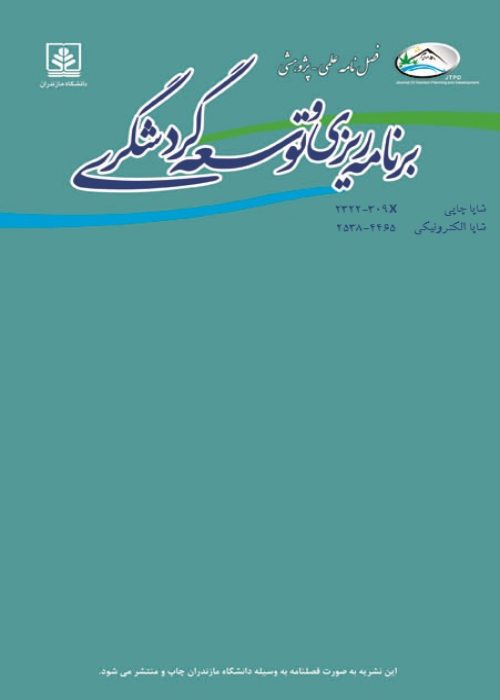Operationalizing Psychic Distance in Tourism Marketing (Case study:Iran as a Destination)
Abstract:
Introduction
In international marketing، the concept of psychological/psychic distance has been applied widely; for instance، it has been used as an influential factor over managers’ decisions in investing in a foreign country. It is applied at tourists who are the investors during a trip. Their final decision obviously is a destination with less psychological distance as this reduces “Uncertainly Avoidance” factor and increases “Security and Reassurance”. International tourists may perceive tourism destinations differently from their home countries. The concept of psychic distance refers to perceived similarities or differences between specific destinations and a tourist''s home country. The unique attributes of destination، which make it different from a tourist’s home country، may be an important factor during tourists’ decision-making but it is essential for tourist marketers to know to what extent tourists have perceived the gap. when the psychological distance exceeds its acceptable level، it will result in dissatisfaction and this is what should be eliminated from travel experience (Abooali، Mohamed،2012). Psychological distance in tourism context should be measured using the items which are related to tourism nature. There is no rigorous study to investigate psychic distance in tourism industry. The aim of this study is to conceptualize psychic distance in tourism context. Material And Method
In this study، exploratory and confirmatory factor analysis was conduct to extract and validate dimensions of psychic distance in relation to Iran as tourism destination. The members of couch-surfing virtual community (www. couchsurfing. com) took part in the study. This virtual community has different members from all over the world. In this virtual community، members share their previous travel experiences and discuss different destinations before traveling to those destinations. The data of this study were gathered by convenience-sampling method and the sample included non-traveled people who were eighteen years of age or elder. In July - August 2013، 620 respondents participated atthisand they were the ones who visited the virtual tourism community. In this study، a second order factor analysis was used to explain the phenomenon of psychic distance. The average variance extracted (AVE) was calculated for all constructs and the results showed that construct validity was achieved. Discussion and Results
The result of fit indices (RMSEA =0. 059،RMR=0. 049،CFI=0. 954، GFI=0. 928) showed that the measurement model was fitted and it revealed that the construct of psychic distance contained three dimensions of infrastructure، culture and legal distance. The dimension of infrastructure included seven items at the level of political development، level of industrialization and modernization، level of literacy and education، level economic development، communication infrastructure، tourism infrastructure، and development of hospitality service. Six items measured the second dimension (cultural dimension of psychic distance). These items contained language، religious beliefs، core value systems، life style of citizens، cultural symbols and traditions and life rituals. The third dimension (Legal dimension of psychic distance) consisted of four items. The Items of tourism laws، legal system، degree of personal freedom and international policies measured the third dimension of psychic distance. Furthermore، international tourists perceive high psychological distance in relation to Iran as a tourism destination. The result of ANOVA test showed that tourists from different regions perceived different levels of psychic distances about Iran. Tourists from Middle Eastern countries perceived lesser psychic distance than other regions. Conclusion
This study contributes to the body of tourism knowledge by measuring psychic distance construct in tourism context. Based on the results of the current study، potential international tourists perceive psychic distance about Iran as a tourism destination. On the other hand، there are major differences between Iran and a tourist’s country of origin. These differences are referred to as cultural systems، legal systems and infrastructural factors. These differences indicate the deterrents which are useful in developing Iran''s tourism industry. These findings have several managerial implications. Tourismpolicy makers must manage the perceived image of Iran in order to decrease the perceived psychic distance. Furthermore، Iran should modify some social and legal rules to change the perceived psychic distance and develop its tourism industry. The results showed that developing tourism infrastructure can lead to a decrease of perceived psychic distance and expand Iran''s tourist market share. In addition، the results showed that tourists from Middle Eastern countries perceived lesser psychic distance than tourists from other regions. These findings revealed that Iran''s tourism organizations should target Middle Eastern countries as attractive potential markets.Keywords:
Language:
Persian
Published:
Journal of Tourism Planning and Development, Volume:3 Issue: 9, 2014
Pages:
52 to 73
magiran.com/p1313421
دانلود و مطالعه متن این مقاله با یکی از روشهای زیر امکان پذیر است:
اشتراک شخصی
با عضویت و پرداخت آنلاین حق اشتراک یکساله به مبلغ 1,390,000ريال میتوانید 70 عنوان مطلب دانلود کنید!
اشتراک سازمانی
به کتابخانه دانشگاه یا محل کار خود پیشنهاد کنید تا اشتراک سازمانی این پایگاه را برای دسترسی نامحدود همه کاربران به متن مطالب تهیه نمایند!
توجه!
- حق عضویت دریافتی صرف حمایت از نشریات عضو و نگهداری، تکمیل و توسعه مگیران میشود.
- پرداخت حق اشتراک و دانلود مقالات اجازه بازنشر آن در سایر رسانههای چاپی و دیجیتال را به کاربر نمیدهد.
دسترسی سراسری کاربران دانشگاه پیام نور!
اعضای هیئت علمی و دانشجویان دانشگاه پیام نور در سراسر کشور، در صورت ثبت نام با ایمیل دانشگاهی، تا پایان فروردین ماه 1403 به مقالات سایت دسترسی خواهند داشت!
In order to view content subscription is required
Personal subscription
Subscribe magiran.com for 70 € euros via PayPal and download 70 articles during a year.
Organization subscription
Please contact us to subscribe your university or library for unlimited access!



